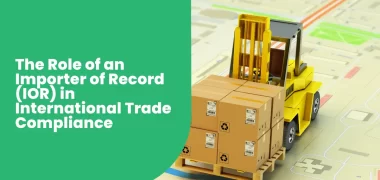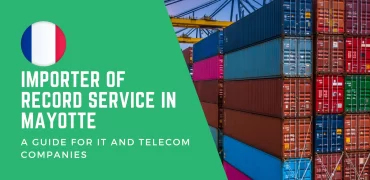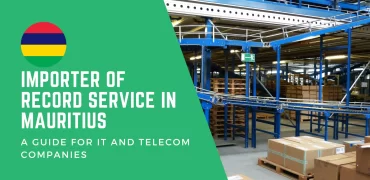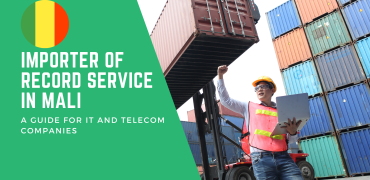In the complex world of international trade, ensuring compliance with various laws and regulations is crucial. One key player in this process is the Importer of Record (IOR). This blog post delves into the vital role an IOR plays in international trade compliance, highlighting their responsibilities, the challenges they face, and their overall impact on global trade operations.
Understanding the Importer of Record (IOR)
An Importer of Record (IOR) is an individual or entity responsible for ensuring that goods imported into a country comply with local laws and regulations. The IOR is accountable for the accuracy of documentation, payment of duties and taxes, and adherence to all import regulations.
Key Responsibilities of an IOR
- Customs Declarations: The IOR must accurately declare the value, classification, and origin of goods to customs authorities.
- Compliance with Regulations: Ensuring that the imported goods meet all local regulations, including safety and environmental standards.
- Payment of Duties and Taxes: The IOR is responsible for paying all applicable import duties, taxes, and fees.
- Documentation: Maintaining accurate and complete records of all import transactions for a specified period.
- Facilitating Inspections: Coordinating with customs authorities for any required inspections or audits.
The Importance of Compliance in International Trade
Compliance with international trade regulations is essential to avoid legal penalties, fines, and shipment delays. It ensures a smooth flow of goods across borders and maintains the integrity of the global supply chain.
Risks of Non-Compliance
- Legal Consequences: Non-compliance can lead to severe penalties, including fines and imprisonment.
- Financial Losses: Delays and fines associated with non-compliance can result in significant financial losses.
- Reputation Damage: Repeated non-compliance can harm a company’s reputation and affect its relationships with partners and customers.
Challenges Faced by Importers of Record
While the role of an IOR is critical, it comes with numerous challenges. These include navigating complex regulatory landscapes, managing documentation, and ensuring accurate tariff classifications.
Regulatory Complexity
- Diverse Regulations: Different countries have unique import regulations, making it challenging to stay compliant across multiple jurisdictions.
- Frequent Changes: Trade laws and regulations are subject to frequent updates, requiring IORs to stay informed and adapt quickly.
Documentation Management
- Accuracy: Ensuring that all documentation is accurate and complete to avoid customs delays and penalties.
- Record Keeping: Maintaining thorough records of all import transactions, often for several years, to comply with local laws.
Tariff Classification
- Correct Classification: Accurately classifying goods according to the Harmonized System (HS) codes to determine the correct duties and taxes.
- Avoiding Misclassification: Preventing errors in classification that can lead to underpayment or overpayment of duties.
Strategies for Effective Compliance
To navigate the complexities of international trade compliance, IORs can implement several strategies. These include leveraging technology, partnering with experts, and staying updated on regulatory changes.
Leveraging Technology
- Automated Solutions: Utilizing software for automated customs declarations and compliance checks to reduce errors and increase efficiency.
- Data Management: Implementing robust data management systems to keep accurate records and facilitate audits.
Partnering with Experts
- Customs Brokers: Collaborating with experienced customs brokers who can provide guidance on compliance matters and handle documentation.
- Legal Advisors: Consulting with legal experts specializing in international trade to navigate complex regulatory landscapes.
Staying Updated on Regulations
- Regular Training: Providing ongoing training for staff on the latest import regulations and compliance practices.
- Industry Networks: Joining industry associations and networks to stay informed about regulatory updates and best practices.
The Impact of an IOR on Global Trade
The role of an IOR extends beyond compliance, influencing the efficiency and reliability of global trade operations. A competent IOR can streamline the import process, reduce costs, and enhance supply chain resilience.
Enhancing Supply Chain Efficiency
- Streamlined Processes: Efficient handling of import procedures reduces delays and ensures timely delivery of goods.
- Cost Reduction: Accurate classification and documentation help avoid unnecessary duties and penalties, reducing overall import costs.
Building Supply Chain Resilience
- Risk Management: Proactive compliance strategies mitigate risks associated with regulatory changes and non-compliance.
- Reputation Management: Consistent compliance builds trust with partners and customers, strengthening the company’s market position.
Conclusion
The Importer of Record plays a crucial role in international trade compliance, ensuring that goods move smoothly across borders while adhering to all regulatory requirements. By understanding their responsibilities, the challenges they face, and the strategies for effective compliance, businesses can better navigate the complexities of global trade. Leveraging technology, partnering with experts, and staying updated on regulations are key to maintaining compliance and enhancing the efficiency and resilience of the supply chain. As international trade continues to evolve, the role of the IOR remains indispensable in ensuring compliance and facilitating global commerce.




